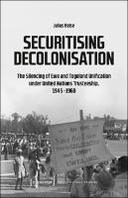Explore

With the right to petition the United Nations, the Ewe and Togoland unification movement enjoyed a privilege unmatched by other dependent peoples. Using language conveying insecurity, the movement seized the international spotlight, ensuring that the topic of unification dominated the UN Trusteeship System for over a decade. Yet, its vociferous securitisations fell silent due to colonial distortion, leaving unification unfulfilled, thus allowing the seeds of secessionist conflict to grow. At the intersection of postcolonial theory and security studies, Julius Heise presents a theory-driven history of Togoland's path to independence, offering a crucial lesson for international statebuilding efforts.
This book is included in DOAB.
Why read this book? Have your say.
You must be logged in to comment.
Rights Information
Are you the author or publisher of this work? If so, you can claim it as yours by registering as an Unglue.it rights holder.Downloads
This work has been downloaded 40 times via unglue.it ebook links.
- 40 - pdf (CC BY) at OAPEN Library.
Keywords
- Administration
- Globalization
- International relations
- Political Science
- Politics
- Postcolonialism
- security
- State
- statebuilding
- thema EDItEUR::J Society and Social Sciences::JP Politics and government::JPH Political structure and processes::JPHC Constitution: government and the state
- thema EDItEUR::J Society and Social Sciences::JP Politics and government::JPP Public administration
- thema EDItEUR::J Society and Social Sciences::JP Politics and government::JPS International relations
- Togo
- Trusteeship
Links
DOI: 10.14361/9783839473061Editions

